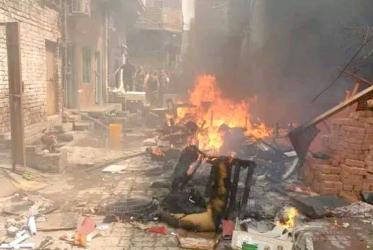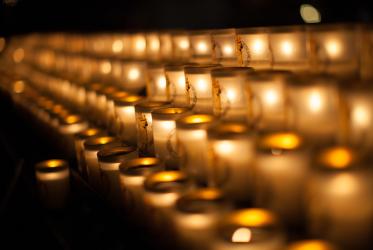Adopted, Friday 16 September 2005
The people of Haiti are presently passing through an extremely difficult period. The poorest country in the Americas has experienced serious social and political turmoil, which continues to have a huge impact on the lives of Haitians. The last years of former President Aristide were characterised by violence, corruption, impunity and chaos. In early 2004 a violent uprising forced Aristide into exile and an interim government was established. This government has called for elections in November 2005.
Despite the presence of the UN stabilisation mission in Haiti (MINUSTAH) violence by armed gangs continues to be a threat to the population, particularly in some areas of the capital, Port-au-Prince. Killings, rape, kidnapping and extortion are common and are used as a weapon to instil fear and insecurity amongst the people. In addition to the political instability, there is endemic poverty and environmental degradation throughout the country.
History has been hard on Haiti which was in many ways born as a "promised land". In 1804, a former slave led the independence movement in Haiti that resulted in the creation of the first black-led republic and the first Caribbean state to achieve independence. Through its history, Haiti has experienced invasion by the United States, followed by 30 years of Duvaliers' dictatorship, UN sanctions after the coup d'état of 1991 and natural disasters including hurricanes and earthquakes. Last year, severe floods left more than 2000 dead or unaccounted for and over 200,000 Haitians homeless.
Despite this apparently hopeless situation, churches have actively engaged in the struggle for peace and justice, especially in recent years. Churches have issued messages to denounce the situation of 2003 and to call the Haitian people to reconcile. These messages have greeted the courage and determination of the Haitian people and their refusal to be governed by arbitrary means, abuse of human rights and ongoing impunity. They stressed the need for Haitians to learn to live together in peace and harmony. To help in the process of reconciliation, the messages imply the need for discussion on a new social contract, and also place emphasis on the need to build anew the Haitian nation, after the collapse of its society.
The World Council of Churches (WCC) has followed closely the developments in Haiti. A letter from the WCC's General Secretary in September 2003 to the Protestant Federation of Haiti and member churches responded to the Federation's message to the nation on August 2003. It recalled WCC's support to the churches and to the peace initiatives in the country and asked for an effective implementation of the democratisation process and new elections. In November 2003, an ecumenical delegation comprised of the Caribbean Conference of Churches (CCC), the WCC, and Church World Service, visited Haiti to assess the situation and express solidarity with the churches and the people. The report highlighted the deepening of the political crisis, increasing violence and insecurity within the country, and abuse of human rights as well as the deterioration of the economy and the social fabric.
The visit of the WCC General Secretary to Haiti in August 2005 included amongst others meetings with member churches, representatives of other churches, ecumenical organisations, the interim President and the Special Representative of the UN Secretary General in Haiti and chief of MINUSTAH. From the meetings held it was clear the civil society and the churches have joined hands to overcome the crisis and bring about change in social and political conditions to ensure the rule of law. A need to rebuild and strengthen the state was expressed, together with a stronger support from the UN, so the state could fulfil its obligations to protect the population and grant civil and political, economic, social and cultural rights, particularly in the areas of education, health and labour conditions, and political elections. The visit strengthened the links with member churches, affiliated bodies and the ecumenical movement and expressed the concern, solidarity and prayers of the ecumenical family for the people of Haiti.
Acknowledging the critical situation in Haiti, the enormous challenges faced by the people and the witness of the churches in the country, touched in our minds and our hearts by this reality, the Executive Committee of the WCC, meeting in Geneva, 13-16 September 2005:
Reaffirms its deep concern for the current unstable political situation in Haiti and acknowledges the efforts being made by different actors at the national and international levels to overcome it and strengthen democracy with peace and justice;
Expresses at the same time its concern for the continuous degradation of the environment and subsequent increasing vulnerability of the Haitian people to natural disasters, the migratory flux towards other countries and the heavy burden of external debt;
Calls on the government of Haiti to guarantee welfare for all and to strengthen democracy through the independence of the judiciary; to establish a security system for all, that prevents the spread of small arms and gangs in the country and prohibits arms trafficking; to ensure good governance and enactment of legislation for effective implementation of the electoral system in order to have an elected government in power by early 2006; to develop social policies that specifically address reintegration of the children and youth involved in armed groups;
Asks the international community, especially the UN, the UN Stabilisation Mission in Haiti (MINUSTAH), the Organization of American States and the CARICOM (Caribbean Community of States) and the Rio Group, to strengthen its support to the process towards democracy, peace and justice in Haiti;
Reminds the international community and international financial institutions of the pledge made in July 2004 to support development initiatives in the country, strengthen democratic institutions and alleviate the debt burden and calls on them to fulfil their commitment without delay;
Welcomes the important contribution of civil society and commends its efforts towards unity, consensus and a new social contract of inclusion;
Acknowledges the important role of the churches in Haiti in building peace, justice and reconciliation; and calls on them to intensify ecumenical initiatives in this respect, especially the commitment of the churches to participate in the Decade to Overcome Violence - Churches seeking reconciliation and peace, following the biblical teaching "Seek peace and pursue it" (Psalm 34:14);
Commends the work being done in the country by international ecumenical partners such as Action by Churches Together (ACT) and the Lutheran World Services (LWS) through their local offices and networks;
Calls upon WCC member churches:
-
seriously to consider, together with specialised ministries and other ecumenical partners, to provide support to the churches in Haiti to develop an election monitoring team and provide it with necessary leadership;
-
to express solidarity through actions and prayers for the people and the churches of Haiti, and to accompany and support them in these times of difficulty;
-
to continue to be involved and follow the political development in Haiti to support processes towards genuine popular participation and a new social contract.


